Thank you, Saint Paul College!
Saint Paul College recently completed its Mid-Cycle Review site visit (October 7-8, 2024) with the Higher Learning Commission (HLC). This important process helps ensure we continue to meet the HLC’s high standards for quality and continuous improvement.
The visit provided a valuable opportunity to showcase our dedication to student success, continuous improvement, and community engagement. We are proud of how our community came together to demonstrate the mission, vision, and values of Saint Paul College.
We appreciate the participation and support of our entire college community. We will share the outcome of the HLC review when it becomes available.
Criteria for Accreditation
Criterion 1
Mission
The institution’s mission is clear and articulated publicly; it guides the institution’s operations.
Criterion 2
Integrity: Ethical and Responsible Conduct
The institution acts with integrity; its conduct is ethical and responsible.
Criterion 3
Teaching and Learning: Quality, Resources, and Support
The institution provides quality education, wherever and however its offerings are delivered.
Criterion 4
Teaching and Learning: Evaluation and Improvement
The institution demonstrates responsibility for the quality of its educational programs, learning environments, and support services, and it evaluates their effectiveness for student learning through processes designed to promote continuous improvement.
Criterion 5
Institutional Effectiveness, Resources and Planning
The institution’s resources, structures, processes and planning are sufficient to fulfill its mission, improve the quality of its educational offerings, and respond to future challenges and opportunities.
Criteria Corner
We’re taking over this corner of the website for the next month!
We will feature the five HLC Criteria for Accreditation, showcase how Saint Paul College responded to the assurance processes, and highlight our dedication to quality and continuous improvement.
mission, vision, & values
Criterion 1
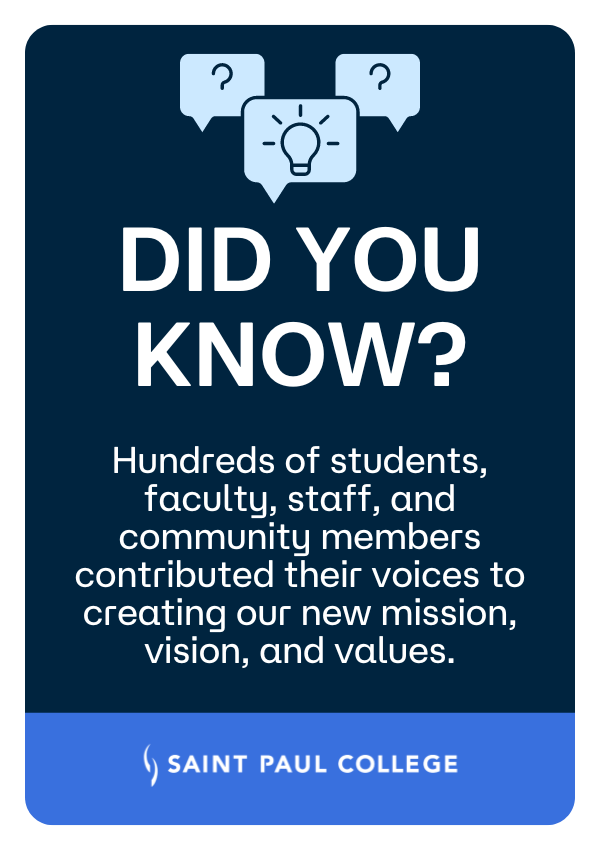 Criterion 1 of the Higher Learning Commission (HLC) accreditation process focuses on an institution’s mission, vision, and values and how these statements guide its operations.
Criterion 1 of the Higher Learning Commission (HLC) accreditation process focuses on an institution’s mission, vision, and values and how these statements guide its operations.
Ready to see our mission in action?
Review the sample questions and highlights below:
Sample Questions
Here are some example questions that a review team might ask during a site visit:
- Tell me about the College’s mission and how you understand it.
- How does the SPC mission inform the institution’s academic offerings, student services, and overall operations?
- How is the SPC mission communicated to students, faculty, staff, and the broader community?
- How are the SPC values reflected in its policies, practices, and decision-making processes?
- How does your department support SPCs mission?
- How does SPC serve the public good?
Highlights
This section highlights how Saint Paul College’s mission is central to our operations and decision-making, demonstrating our commitment to serving the public good and fostering an inclusive learning environment.
During the 2021-2022 academic year, SPC revised its mission, vision, and values through a consensus-building process delivered via various formats, including workgroups, emails, surveys, town halls, and feedback opportunities. This guided the development of the current strategic plan. The revised mission, vision, and values reflect a collaborative process that reflects the college’s commitment to racial equity, community vibrancy, and economic vitality. This is reflected in college plans and handbooks and included in campus signage and the website.
The strategic plan, Creating a Stronger Future 2025, is directly aligned with the mission, vision and values. The four strategic directions are:
- Develop as an anti-racist, trauma-informed college;
- Cultivate a student-centered learning environment promoting and supporting academic excellence and personal development;
- Strengthen the organizational culture by encouraging collaboration, transparent communication, and optimizing operations;
- Build, enhance, and sustain relationships with community partners that respond to the community’s changing economic and workforce needs and contribute to a more socially just world.
Anti-Racist Trauma Informed (ARTI) Plan
- Academic Offerings and student support services align with the institution’s mission and include learning communities, four directions, iLEAD, Basic Needs Resources, a Campus Food Pantry, and Mental Health Counseling Services.
- All new and proposed policy changes begin with a review by the equity and inclusion committee
- Examples of programming: Equity by design, Mental Health First Aid training, NCORE attendance
SPC cultivates and nurtures external relationships that align with its mission as an educational institution, responds to community needs, and integrates diverse community perspectives from various constituencies into our work. This includes basic needs partnerships, educational partnerships, workforce partnerships, philanthropic partnerships, and community partnerships. Our 2023 Strategic Plan Progress Report details our partnerships, their impact, and other strategic initiatives.
Ethical and Responsible Conduct
Criterion 2
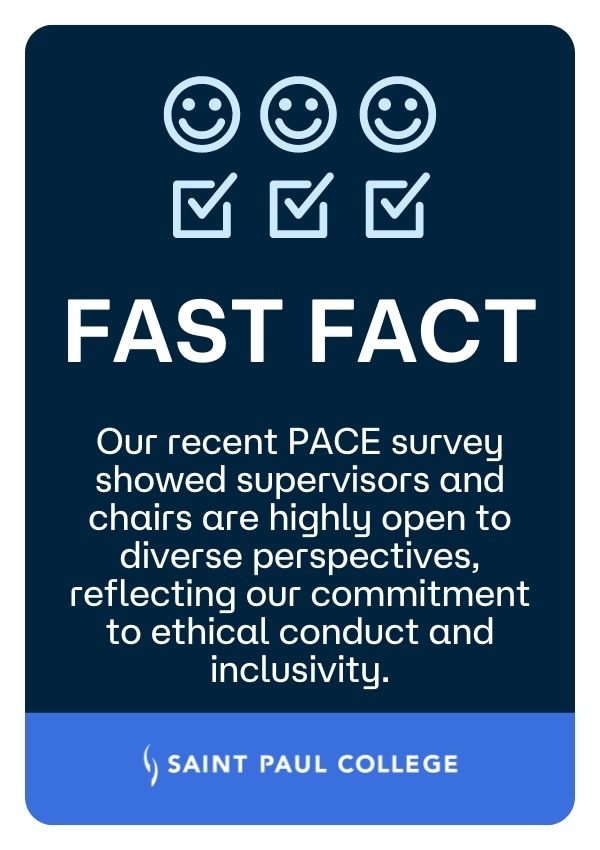 Criterion 2 focuses on an institution’s commitment to ethical and responsible conduct. At Saint Paul College, integrity and ethical behavior are woven into everything we do.
Criterion 2 focuses on an institution’s commitment to ethical and responsible conduct. At Saint Paul College, integrity and ethical behavior are woven into everything we do.
Ready to see how we put these principles into practice? Read the highlights and potential questions below:
Sample Questions
Here are some example questions that a review team might ask during a site visit:
- How does Saint Paul College ensure ethical practices are upheld across all departments and functions? Can you provide a specific example?
- How does the college’s commitment to social justice and equity influence decision-making processes at various levels?
- How does the college communicate its financial policies to faculty, staff, and students, especially regarding transparency and accountability?
- What training and development opportunities are provided to ensure faculty and staff understand and adhere to ethical guidelines?
- How does the college guarantee that information presented to students and the public (e.g., about programs, costs, faculty) is accurate and up-to-date?
- What mechanisms are in place for responding to public inquiries or complaints regarding institutional practices or policies?
- How does the college ensure that any research conducted adheres to ethical standards, particularly in protecting human subjects?
- Can you describe any recent initiatives or actions taken to address issues of campus climate, diversity, or equity, and how they connect to ethical conduct?
Highlights
Institutional Integrity
Saint Paul College (SPC) emphasizes integrity in its financial, academic, and human resource practices. The revised mission and vision, developed in response to significant societal events like the COVID-19 pandemic and the murder of George Floyd, reflect the college’s dedication to social justice and eliminating inequities. This commitment is woven into strategic planning and decision-making processes across the institution.
Financial Integrity
SPC adheres to State of Minnesota statutes, Minnesota State policies, and Generally Accepted Accounting Principles (GAAP). The System Office monitors internal controls and reconciliations by requiring the College to submit certifications regularly. Regular audits ensure compliance, and no financial deficiencies have been noted in recent years. At Saint Paul College, checks and balances in financial operations are in place to maintain transparent operating practices.
Human Resources Integrity
The college promotes equal opportunity, nondiscrimination, and requires mandatory training for all employees, including search committee training to avoid unconscious bias. The college has an employee complaint process. As part of strategic direction three in the strategic plan, SPC continuously works to strengthen the organizational culture by encouraging collaboration, transparency, and communication.
Academic Integrity
SPC follows strict credentialing and course credit assignment policies and maintains an open process for handling student complaints. The policies and procedures regarding student concerns, complaints, and grievances are described in the Student Handbook. The college website communicates Saint Paul College’s policies and procedures.
Public Representation
SPC provides accurate and complete information about its academic programs, staff, costs, and governance through various channels like its website and catalog. Recent improvements, such as the 2024 website redesign, ensure transparency and focus on user needs, particularly for prospective students. The institution also publishes information mandated by federal and state laws, such as crime statistics and tuition costs.
Governing Board Autonomy
SPC’s governing board, the Minnesota State Board of Trustees, operates independently to act in the institution’s best interest, balancing internal and external stakeholder needs. The board oversees financial and academic policies, ensuring compliance with legal and fiduciary responsibilities. It delegates day-to-day operations to the college administration, preserving the board’s objectivity and decision-making autonomy.
Academic Freedom and Freedom of Expression
SPC supports academic freedom and freedom of expression through policies aligned with Minnesota State Board guidelines. Faculty and students are encouraged to engage in open dialogue and debate, with protections in place for intellectual inquiry. The institution also fosters an inclusive campus climate through Teaching Circles, encouraging ongoing professional development and communication among faculty.
Responsible Knowledge Practice
Though not a research-focused institution, SPC maintains ethical standards in scholarly practices. The Institutional Review Board (IRB) ensures compliance with research regulations, while the college provides guidance and resources to students on academic honesty and integrity. Policies on academic honesty are clearly communicated to students, and SPC has responded proactively to emerging challenges like the use of AI tools in academic work. SPC’s conduct demonstrates a robust commitment to integrity in all areas of its operations, from financial management to academic practices. Through transparent governance, comprehensive policies, and a focus on social justice, the institution ensures ethical behavior and responsible conduct from its administration, faculty, and students
Teaching and Learning: Quality, Resources, and Support
Criterion 3
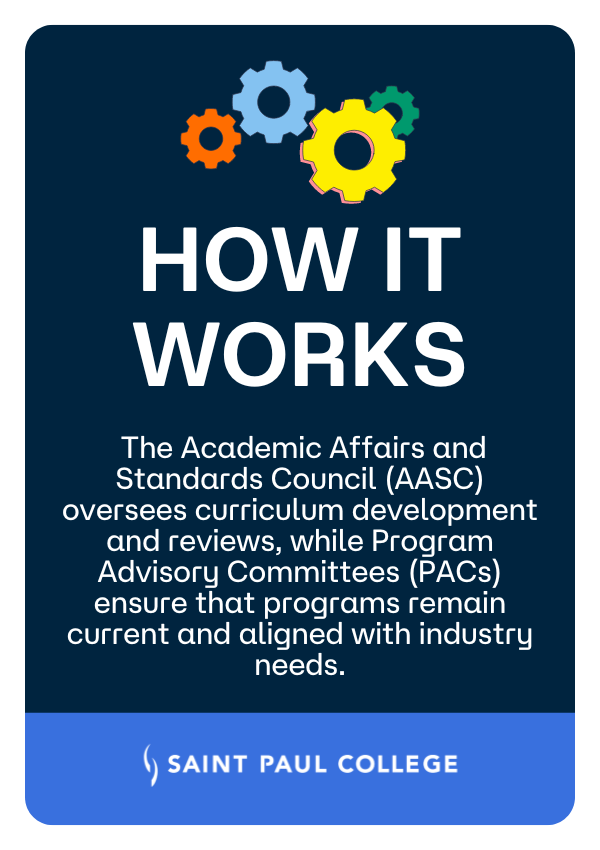 Criterion 3 focuses on the quality of education provided by the institution, regardless of delivery method. Saint Paul College is committed to providing high-quality education in all its formats, including online, hybrid, and in-person.
Criterion 3 focuses on the quality of education provided by the institution, regardless of delivery method. Saint Paul College is committed to providing high-quality education in all its formats, including online, hybrid, and in-person.
To learn more about how Saint Paul College fulfills this criterion, please review the following information.
Sample Questions
Here are some example questions that a review team might ask during a site visit:
- How do you ensure that all courses section offerings via different modalities (online, hybrid, in-person) have the same learning outcomes?
- How does SPC assess the effectiveness of its student support services, and what changes have been made based on assessment results?
- What is the purpose of SPCs general education program? In what ways does the program achieve its goals for students? How could it be improved?
- What resources are available to support faculty? Are these sufficient to meet faculty needs?
- What plans are in place to address co-curricular programs and assessment?
- Tell us about support for student learning and effective teaching. What works well, and what could be improved?
- How does SPC ensure that its educational offerings align with its mission and serve the needs of its students and the community?
- What systems are in place to regularly review and improve academic programs?
- How does SPC foster collaboration between faculty, staff, and external stakeholders (such as industry representatives) to ensure program quality and relevance?
- What is the role of the Academic Affairs and Standards Council in approving curriculum changes?
Highlights
Academic Rigor and Program Consistency
SPC ensures that its courses and programs meet appropriate levels of academic rigor and align with industry standards. The Academic Affairs and Standards Council (AASC) oversees curriculum development and reviews, while Program Advisory Committees (PACs) ensure that programs remain current and aligned with industry needs. External accreditations and internal program review processes further support consistency and quality across all instructional modes, including online and in-person courses.
Engagement and General Education
SPC offers a comprehensive general education curriculum designed to prepare students for success in both the workforce and further education. Grounded in the Minnesota Transfer Curriculum (MnTC), the program covers a wide array of disciplines and promotes critical thinking, communication, and civic responsibility. The college also integrates anti-racism and trauma-informed practices throughout its educational offerings, ensuring that students are equipped with the skills to thrive in a diverse, multicultural world.
Qualified Faculty and Staff
SPC is committed to employing a diverse and highly qualified faculty and staff. All instructors meet credentialing requirements, including those teaching dual credit and consortial courses. Faculty members are regularly evaluated and provided with professional development opportunities through the Academic Effectiveness and Innovation (AEI) unit. The institution also supports continuous learning and development for its staff, especially those involved in student support services.
Student Support and Resources
SPC offers extensive student support services, tailored to the diverse needs of its student population. These include academic tutoring, advising, mental health services, and a campus food pantry. The college uses tools like EAB Navigate to provide coordinated care and proactively address students’ needs. SPC also supports effective teaching through robust technological infrastructure, including upgraded labs, libraries, and online learning platforms. Faculty receive comprehensive support from AEI, including instructional design consultations and professional development.
Teaching and Learning: Evaluation and Improvement
Criterion 4
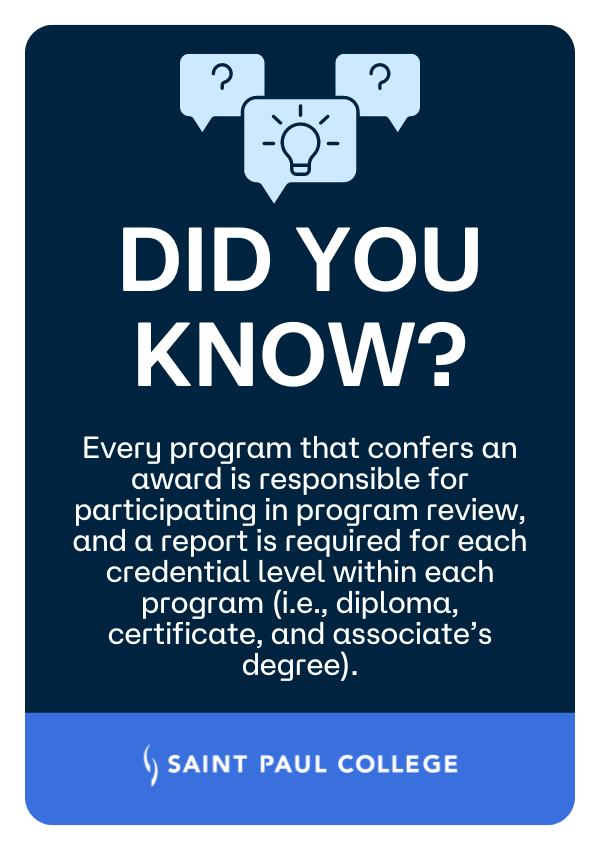 Criterion 4 focuses on the institution’s commitment to evaluating and improving the quality of its educational programs, learning environments, and support services. Saint Paul College demonstrates this commitment through its ongoing assessment of student learning, regular program reviews, and its use of data to inform improvements.
Criterion 4 focuses on the institution’s commitment to evaluating and improving the quality of its educational programs, learning environments, and support services. Saint Paul College demonstrates this commitment through its ongoing assessment of student learning, regular program reviews, and its use of data to inform improvements.
Sample Questions
Here are some example questions that a review team might ask during a site visit:
- How does SPC ensure that its educational programs maintain academic rigor and meet industry standards?
- Describe the program review process and how findings from these reviews are used to improve programs?
- How does SPC evaluate the success of its graduates, both in terms of employment and further education? (How do you know you are effective? How do you know you are successful?)
- Explain how SPC assesses student learning outcomes across different programs and courses?
- How is the data collected from assessment activities used to improve student learning and inform curriculum changes?
- What role do faculty play in the assessment of student learning, and how are they supported in this process?
- Can you provide examples of specific improvements made as a result of assessment data? ((What changes have you made as a result of assessment?)
- How are co-curricular activities assessed for their contribution to student learning and development?
- What are SPC’s goals for student retention, persistence, and completion, and how do these align with your mission?
- Can you provide examples of interventions or programs the college has implemented to improve retention and completion, particularly for underrepresented student populations?
- How does SPC support students who are at risk of not completing their programs, and how do you measure the effectiveness of those support services?
Highlights
Ensuring Quality
Saint Paul College (SPC) maintains the quality of its academic programs through various mechanisms. Regular program reviews, both annual and comprehensive, assess learning outcomes, enrollment trends, and program retention, allowing for data-driven adjustments. Established procedures ensure the proper evaluation of transfer credits and prior learning to uphold academic standards. Dual credit courses are held to the same college standards and faculty credentialing requirements. SPC also maintains specialized program accreditation for specific programs and evaluates the success of its graduates through job placement monitoring and transfer tracking via surveys and program review dashboards.
Assessment of Student Learning
Saint Paul College (SPC) engages in systematic assessment of student learning, using data collection, analysis, and reflection to inform curriculum changes. This data is used to enhance teaching methods, curriculum design, and student support services. Faculty and staff are actively involved in this process, aligning with best practices in higher education.
Improving Retention and Completion
To improve retention and completion, SPC has defined ambitious goals, particularly for BIPOC students, aligning with Minnesota’s Equity 2030 initiative and outlined in the Strategic Plan. The institution collects data on retention, persistence, and completion to inform programmatic changes and strategic planning. Interventions like ILEAD and We Thrive focus on improving success outcomes for BIPOC students through holistic support services.
Institutional Effectiveness, Resources and Planning
Criterion 5
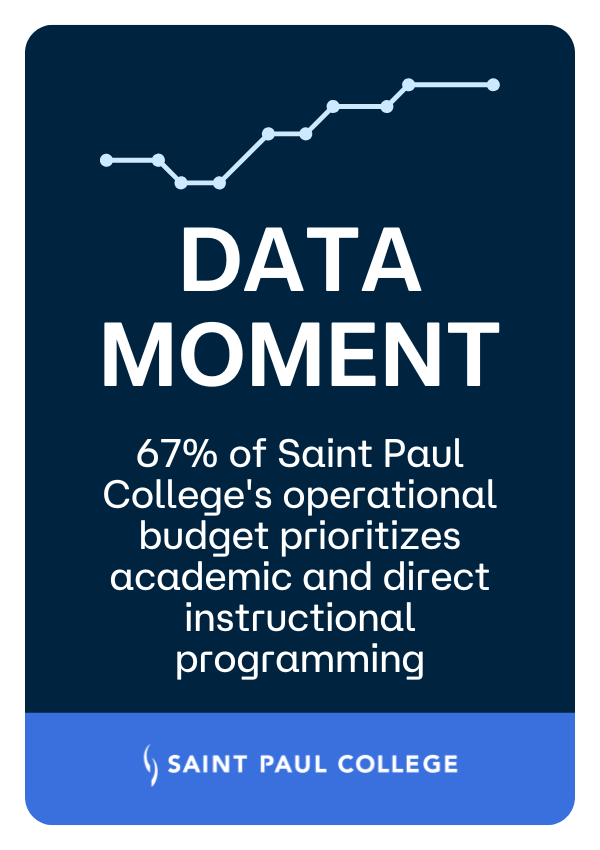 Criterion 5 emphasizes the importance of having the right resources, structures, and planning in place to fulfill an institution’s mission, improve educational quality, and adapt to future challenges. Saint Paul College demonstrates this through its strong governance structure, which includes shared decision-making and data-informed strategies.
Criterion 5 emphasizes the importance of having the right resources, structures, and planning in place to fulfill an institution’s mission, improve educational quality, and adapt to future challenges. Saint Paul College demonstrates this through its strong governance structure, which includes shared decision-making and data-informed strategies.
Sample Questions
Here are some example questions that a review team might ask during a site visit:
- Describe your annual budgeting process.
- How do you prioritize expenditures and requests?
- What measures do you have in place for handling emergency or unexpected costs?
- How does the college link assessment of student learning to budgeting?
- How do program reviews relate to the budgeting process?
- How does assessment of student learning relate to your budgeting process?
- How are faculty and staff incorporated into the college’s financial planning and budgeting processes?
- We would like to know more about the role of the governing Board of Trustees and how they provide oversight of Saint Paul College.
- How are students involved as the College sets academic requirements, policies, and processes?
- How does Saint Paul College’s planning process encompass the institution and consider the perspectives of internal and external constituent groups?
- The team has had the opportunity to review your documents about Criterion 5. What are some of the challenges you face in the following areas:
- Fiscal or financial resources?
- Physical plants and facilities?
- Technology?
- Data security?
- The institution plans on the basis of a sound understanding of its current capacity, including fluctuations in the institution’s sources of revenue and enrollment.
- Factors such as changes in technology and demographic shifts can impact an educational institution. How does Saint Paul College anticipate or consider such factors in planning?
- What are examples of some of the changes you made that you are proud of that resulted in improvement and institutional effectiveness?
- How does Saint Paul College implement its plans to systematically improve its operations and student outcomes?
- What are the major challenges for Saint Paul College in the next 5 years?
- How do faculty and staff access data related to their areas?
- Is there a dashboard? Who has access and what types of data are available?
Highlights
Shared Governance and Collaboration: Saint Paul College fosters a culture of shared governance, with active participation from faculty, staff, students, and administration in planning and decision-making. This collaborative approach ensures diverse perspectives are considered and promotes transparency.
Data-Informed Decision-Making: The college emphasizes data-driven approaches in all aspects of its operations. This includes using data to inform strategic planning, resource allocation, program evaluation, and student success initiatives.
Resource Allocation and Financial Stability: Saint Paul College maintains a strong financial position and allocates resources effectively to support its mission and strategic goals. The college prioritizes funding for academic programs and student support services.
Continuous Improvement: Saint Paul College is committed to continuous improvement through ongoing assessment, program review, and data analysis. This commitment ensures that the college’s programs and services remain relevant and effective.
Proactive Planning: The college engages in proactive planning to address future challenges and opportunities. This includes considering factors such as technological advancements, demographic shifts, and economic trends.
Student Success: Saint Paul College prioritizes student success through various initiatives, including enhanced support services, data-driven interventions, and a focus on equitable outcomes.
Infrastructure and Technology: The college invests in infrastructure and technology to support its operations and enhance the learning environment for students. This includes modernizing facilities, providing IT support, and ensuring access to the latest technological tools.